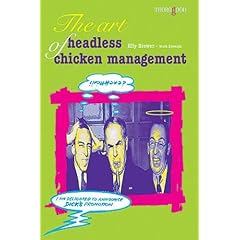Well then. I present to you a picture of The World-Famous Chicken Teapot:

The World-Famous Chicken Teapot (hereinafter The Chicken) was a creation of mine in the early spring of 1999, during my last ceramics class at my dear alma mater, Clemson University (who's Tigers are ranked 18th this week, by the way, even if the special teams have turned out to be more the short-bus kind of special than we'd hoped).
The Chicken was a brainstorm for a teapot project. In fact, I produced several teapots for this project, one of which is a modified whiskey jug with a seven-inch spout that looks very much like an oil can you'd see on a steam locomotive (and remains one of my favorite of all my ceramic creations). I designed The Chicken so that you would put water in the back of the chicken, and then put the lid on, and heat the water for tea, and pour the tea out the chicken's beak. To this end the beak does in fact have a small opening. But for the fact that mysterious evildoers stole not one but three different tails I had created for The Chicken, it would work as intended. Instead, I stuck some silk autumn leaves in its butt; not terribly dignified, but it will do. (Observant readers may note that the teapot lacks a handle and would thus be hard to use. Really observant readers will recognize that of course it's art, so that doesn't matter.)
Although I find chickens terribly amusing, when I first decided to make a chicken-shaped teapot I could not say what, exactly, a chicken looked like. I mean, I could draw you a chicken you'd recognize as such, but what about those little chin dangles and that cockscomb on top? Should I put that in? What does a proper chicken actually look like?
I could have gone over to the agriculture department and asked to see some of their chickens, and I wish I'd thought of that at the time because it would have been terribly amusing. Imagine: there you are, working at your desk in the P&A building, and some possibly-deranged person walks up and says, "I would like to see a chicken, please."
Anyway, so much the better that I instead turned to the more obvious resource, the computer lab upstairs from the ceramics studio and the internet. (I did not google "chicken;" there was no Google yet. At the time, the search engine of choice for wise surfers was Dogpile. Remember Dogpile? You couldn't verb that word, at least not while remaining G-rated; that's why Dogpile failed.)
One of the first sites I came across had pictures of a rubber chicken with a notebook tied around its neck. This was too bizarre to pass up, so I entered into the domain of
The Playa Chicken. The Playa Chicken had wandered around the crowd for several days at a wonderful festival I'd never heard of called
Burning Man. I looked at the Playa Chicken's pictures, and remembered the web site so I could go back that evening from my own computer and learn more.
Burning Man has changed since 1998 (it was the 1998 festival that I read about on Playa Chicken that year). That year there were 10,000 participants; the 2006 festival was four times as large. It's anyone's guess how long the festival will remain viable given the pace of growth. This year, a city the size of Burlington, Vermont, was built and dismantled on the unforgiving terrain of Nevada's
Black Rock Desert in the space of 10 days. The citizens there packed everything in and everything out; they engaged in no commercial activity apart from purchasing ice (profits from which are donated to the local school system). They did not drive cars. They produced art, and music, had parades, ate and slept and lived and experienced an event utterly unlike any other on Earth.
And yes, they did other things. Of course, they burned The Man, from which the festival gets its name. The festival has a bit of a reputation for promiscuity and drug use, too, and certainly many of its participants engaged in both activities, though the festival is not designed to encourage such behavior, only not to discourage it. Burning Man is much bigger than a chance for immature people to sleep around and get high, and charges that it is nothing more are just silly; after all, the same charges could easily be leveled at any American high school and most colleges.
I've wanted to go to Burning Man since I first stumbled across the Playa Chicken and his website. The Chicken sits placidly on its end table under the picture window in my living room, and reminds me of that. I don't think about it often, but the desire is there, just as The Chicken is there.
It's a cliché that there's a first time for everything. I believe, though, that there is also a last chance for first times, that there is a window during which you may do something for the first time, but as life marches on that window slowly closes and eventually you reach a point where, no matter how much you desire it, you will never do that thing. I believe the window is closing on my first time to go to Burning Man.
Next year I'll be 29. For the second time. I'll be a civilian, also for the second time, sometime in the spring. I hope to take some time off from work; one reason why I volunteered to deploy to Djibouti (see, I told you it's fun to say that word) was to save up some money to live off of for a few months so that I am not immediately forced to start looking for work as soon as I separate. But that situation cannot last; I'll be working again by the end of the year, probably by the end of the summer, and I don't really expect I'll have found a job that I especially like. I hope to find one I dislike less than my current one. Burning Man 2007 will run for a week starting August 29th, thus ending about the time I expect to start a new job.
I suspect that if I don't go to Burning Man in 2007, I will never go. That would be a shame. This is something I feel I need to see—and not just see, but actually do. Participate in. One of Burning Man's key tenets is "No Spectators." You must participate. How do you do that? You can volunteer at the ice tent. You can help set up and tear down a theme camp. You can produce art, wear costumes, play music, tell stories; you can do all sorts of things, anything, in fact—that's the point. You can do anything.
I have never felt like I could do "anything." My internal governor has always told me when not to do things I want to do, to save myself embarrassment or, worse, failure. In some sense, it's that governor I'm hoping to leave behind when I get to the playa. I want to know what that's like.
Many Burners work every day for The Man, punch a clock like the rest of us, and look forward all year to the festival as their one chance to leave it all behind and experience a few glorious hours of liberty, true liberty. But others have managed to find a way to survive in this country without punching a clock or working for The Man. I like to think they work for The Chicken.
I want to work for The Chicken. I may never be so lucky, and sometimes I feel that as my life rolls on along my chance to find such a job grows ever more remote. As I said, windows close. There's a first time for everything, but we won't all get to see it. If I'm ever going to experience Burning Man, it's going to be next year. So I'm going.
Who wants to join me?



 I've edited Lauderdale, I've read it and edited it again. Now it's other peoples' turn to read it, while I sit back and... well... actually, I have a few other ideas I'm working on. But I'm also taking a bit of a break, which I need. And trying to do some other reading as well.
I've edited Lauderdale, I've read it and edited it again. Now it's other peoples' turn to read it, while I sit back and... well... actually, I have a few other ideas I'm working on. But I'm also taking a bit of a break, which I need. And trying to do some other reading as well. 
